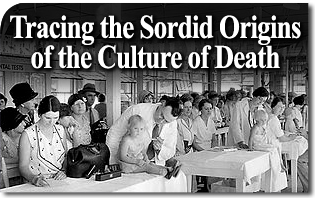
“Three generations of imbeciles are enough.”
With these words, Supreme Court Justice Oliver Wendell Holmes concluded the majority opinion in Buck vs. Bell. The Virginia law allowing the forced sterilization of the so-called “feebleminded” was upheld as constitutional. Carrie Buck, a young woman from Virginia, was ordered to be forcibly sterilized. In the decades that followed, more than 75,000 Americans would undergo the same operation in the name of “settled science.”
In his recent book Imbeciles: The Supreme Court, American Eugenics and the Sterilization of Carrie Buck, author Adam Cohen reveals all the unpleasant details of a dark chapter in American history. And his thorough treatment of eugenics makes for disturbing reading. Cohen shows quite clearly how “social Darwinism” had wide-ranging effects. Weaving together the lives of five key players, Cohen gives all the facts that led to the injustice committed in Buck vs. Bell.
Cohen starts with the nineteenth century philosophy of Herbert Spencer, who coined the phrase “survival of the fittest.” Negating a Divine plan for creation, Spencer and his followers saw the need to “help nature along.” Charles Darwin next provided a scientific framework for this ideology. His cousin Francis Galton soon began advocating the need to get rid of the undesirable elements in humanity. He and his followers began promoting segregation, sterilization, and eventually even infanticide as the means of achieving “racial perfection.”
 Learn All About the Prophecies of Our Lady of Good Success About Our Times
Learn All About the Prophecies of Our Lady of Good Success About Our Times
Idiot. Imbecile. Moron. Schoolyard insults, right? Not before first being used in the highest levels of government and the scientific community. Wouldn’t the progressives of the day have condemned such ideology? Far from it. Theodore Roosevelt, Alexander Graham Bell, Margaret Sanger and many others spoke out in favor of ridding society of the “unfit.” Surely the churches defended the weak, didn’t they? Sadly, eugenics sermon contests had Protestant pastors preaching “race betterment” from the pulpit.
Cohen shows the great measures taken to popularize eugenics among average Americans. Today it is quite common to have livestock judging competitions at local fairs. A century ago, Fittest Family Contests were wildly popular. Blue ribbons were awarded to families at fairs across the land based on physical and intelligence tests.
What is most shocking is the fact that there was such consensus on the issue. No matter that there was so little scientific backing. Anyone who objected to the eugenics movement was labeled a “sentimentalist” and ostracized. The only group who mounted any widespread opposition was the Catholic Church. Catholic legislators opposed eugenic legislation, and Pope Pius XI condemned the movement in Casti Connubii.
Most Americans consider the ideology of eugenics as a product of Nazi Germany. Cohen makes clear that the opposite is the case. American sterilization laws were used as a model for the Third Reich. Madison Grant from New York published a widely read work in 1923 titled The Passing of the Great Race. Adolf Hitler wrote a glowing letter to Grant, going so far as to say “your book is my Bible.” The Nazis even used the majority opinion in Buck vs. Bell in their defense at the Nuremberg trials.
Though it is quite clear from the beginning the author is a liberal, Cohen is to be commended for exposing the horrors of the eugenics movement. He quickly points out that the decision of Buck vs. Bell has never been overturned. He also shows that the era of forced sterilizations came to an end in the 1970s.
No matter how much we might like to think things have changed, the same eugenics mentality persists. Doctors and legislators aren’t the ones enforcing sterilization today. No, average men and women can combat fertility via elective surgery, contraception and abortion.
No more talk of “preserving the race” and “helping nature along,” right? The 90% of unborn children diagnosed with Down syndrome who are aborted speak to the contrary. With the latest technology, embryos used for in-vitro fertilization are tossed aside when defects are found. Genetic modification of embryos is now rightly being called twenty-first century eugenics.
Adam Cohen’s chilling account of the American eugenics movement uncovers a dark time in our history. It is clear the eugenics ideology is alive and well today. Imbeciles should serve as a warning for us so we do not repeat the mistakes of the past.
